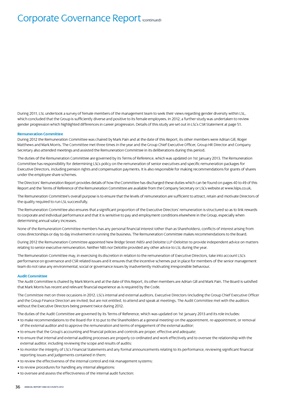
Corporate Governance Report (continued)
During 2011, LSL undertook a survey of female members of the management team to seek their views regarding gender diversity within LSL,
which concluded that the Group is sufficiently diverse and positive to its female employees. In 2012, a further study was undertaken to review
gender progression which highlighted differences in career progression. Details of this study are set out in LSL’s CSR Statement at page 51.
Remuneration committee
During 2012 the Remuneration Committee was chaired by Mark Pain and at the date of this Report, its other members were Adrian Gill, Roger
Matthews and Mark Morris. The Committee met three times in the year and the Group Chief Executive Officer, Group HR Director and Company
Secretary also attended meetings and assisted the Remuneration Committee in its deliberations during this period.
The duties of the Remuneration Committee are governed by its Terms of Reference, which was updated on 1st January 2013. The Remuneration
Committee has responsibility for determining LSL’s policy on the remuneration of senior executives and specific remuneration packages for
Executive Directors, including pension rights and compensation payments. It is also responsible for making recommendations for grants of shares
under the employee share schemes.
The Directors’ Remuneration Report provides details of how the Committee has discharged these duties which can be found on pages 40 to 49 of this
Report and the Terms of Reference of the Remuneration Committee are available from the Company Secretary or LSL’s website at www.lslps.co.uk.
The Remuneration Committee’s overall purpose is to ensure that the levels of remuneration are sufficient to attract, retain and motivate Directors of
the quality required to run LSL successfully.
The Remuneration Committee also ensures that a significant proportion of the Executive Directors’ remuneration is structured so as to link rewards
to corporate and individual performance and that it is sensitive to pay and employment conditions elsewhere in the Group, especially when
determining annual salary increases.
None of the Remuneration Committee members has any personal financial interest (other than as Shareholders), conflicts of interest arising from
cross directorships or day to day involvement in running the business. The Remuneration Committee makes recommendations to the Board.
During 2012 the Remuneration Committee appointed New Bridge Street (NBS) and Deloitte LLP (Deloitte) to provide independent advice on matters
relating to senior executive remuneration. Neither NBS nor Deloitte provided any other advice to LSL during the year.
The Remuneration Committee may, in exercising its discretion in relation to the remuneration of Executive Directors, take into account LSL’s
performance on governance and CSR related issues and it ensures that the incentive schemes put in place for members of the senior management
team do not raise any environmental, social or governance issues by inadvertently motivating irresponsible behaviour.
Audit committee
The Audit Committee is chaired by Mark Morris and at the date of this Report, its other members are Adrian Gill and Mark Pain. The Board is satisfied
that Mark Morris has recent and relevant financial experience as is required by the Code.
The Committee met on three occasions in 2012. LSL’s internal and external auditors, Executive Directors (including the Group Chief Executive Officer
and the Group Finance Director) are invited, but are not entitled, to attend and speak at meetings. The Audit Committee met with the auditors
without the Executive Directors being present twice during 2012.
The duties of the Audit Committee are governed by its Terms of Reference, which was updated on 1st January 2013 and its role includes:
• to make recommendations to the Board (for it to put to the Shareholders at a general meeting) on the appointment, re-appointment, or removal
of the external auditor and to approve the remuneration and terms of engagement of the external auditor;
• to ensure that the Group’s accounting and financial policies and controls are proper, effective and adequate;
• to ensure that internal and external auditing processes are properly co-ordinated and work effectively and to oversee the relationship with the
external auditor, including reviewing the scope and results of audits;
• to monitor the integrity of LSL’s Financial Statements and any formal announcements relating to its performance, reviewing significant financial
reporting issues and judgements contained in them;
• to review the effectiveness of the internal control and risk management systems;
• to review procedures for handling any internal allegations;
• to oversee and assess the effectiveness of the internal audit function;
36 ANNUAL REPORT AND ACCOUNTS 2012